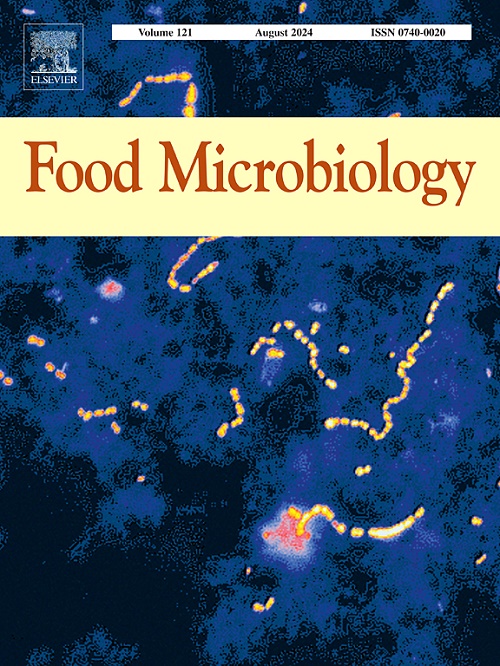Factors affecting ethanol tolerance in Kazachstania unispora Mkaz: membrane characteristics and antioxidative stress
IF 4.5
1区 农林科学
Q1 BIOTECHNOLOGY & APPLIED MICROBIOLOGY
引用次数: 0
Abstract
Kazachstania unispora is extensively utilized as a food-grade fermentation agent due to its strong stress-resistance and superior fermentation properties. However, ethanol stress during fermentation negatively impacts its performance. Therefore, selecting ethanol-tolerant K. unispora and understanding its tolerance mechanisms are critical for enhancing fermentation efficiency and product quality. In this study, a mutant strain K. unispora Mkaz, capable of tolerating up to 20 % (vol/vol) ethanol and exhibiting favorable fermentation characteristics, was developed through mutagenesis. Comprehensive phenotypic and multi-omics analyses were conducted to elucidate the mechanisms underlying its ethanol tolerance. The results indicated that increased levels of total fatty acid (TFA), particularly long-chain fatty acid (LCFA) and very long-chain fatty acid (VLCFA), as well as trehalose and ergosterol under ethanol stress, improved membrane characteristics, thereby enhancing ethanol tolerance. Furthermore, elevated activities of adenosine triphosphatase (ATPase), superoxide dismutase (SOD), and catalase (CAT) contributed to ethanol tolerance by reducing oxidative stress. Genomic and transcriptomic analyses revealed key mutations and differentially expressed genes (DEGs) associated with the biosynthesis of fatty acid (FA), trehalose, and ergosterol, as well as the regulation of oxidative stress. This study provides novel insights into the ethanol tolerance mechanisms in K. unispora, laying a foundation for its potential application in food fermentation.
影响哈萨克植物乙醇耐受性的因素:膜特性和抗氧化胁迫
由于其强大的抗逆性和优越的发酵性能,哈萨克菌被广泛用作食品级发酵剂。然而,发酵过程中的乙醇胁迫对其性能有不利影响。因此,选择耐乙醇的单孢霉并了解其耐受性机制对提高发酵效率和产品质量至关重要。在这项研究中,通过诱变培养了一种突变菌株K. unispora Mkaz,能够耐受高达20% (vol/vol)的乙醇,并表现出良好的发酵特性。通过综合表型和多组学分析来阐明其乙醇耐受性的机制。结果表明,在乙醇胁迫下,总脂肪酸(TFA),特别是长链脂肪酸(LCFA)和甚长链脂肪酸(VLCFA)以及海藻糖和麦角甾醇的含量增加,改善了膜特性,从而增强了乙醇耐受性。此外,腺苷三磷酸酶(ATPase)、超氧化物歧化酶(SOD)和过氧化氢酶(CAT)活性的升高通过降低氧化应激来促进乙醇耐受性。基因组和转录组学分析揭示了与脂肪酸(FA)、海藻糖和麦角甾醇的生物合成以及氧化应激调节相关的关键突变和差异表达基因(DEGs)。本研究为紫杉菌的乙醇耐受机制提供了新的认识,为其在食品发酵中的潜在应用奠定了基础。
本文章由计算机程序翻译,如有差异,请以英文原文为准。
求助全文
约1分钟内获得全文
求助全文
来源期刊

Food microbiology
工程技术-生物工程与应用微生物
CiteScore
11.30
自引率
3.80%
发文量
179
审稿时长
44 days
期刊介绍:
Food Microbiology publishes original research articles, short communications, review papers, letters, news items and book reviews dealing with all aspects of the microbiology of foods. The editors aim to publish manuscripts of the highest quality which are both relevant and applicable to the broad field covered by the journal. Studies must be novel, have a clear connection to food microbiology, and be of general interest to the international community of food microbiologists. The editors make every effort to ensure rapid and fair reviews, resulting in timely publication of accepted manuscripts.
 求助内容:
求助内容: 应助结果提醒方式:
应助结果提醒方式:


